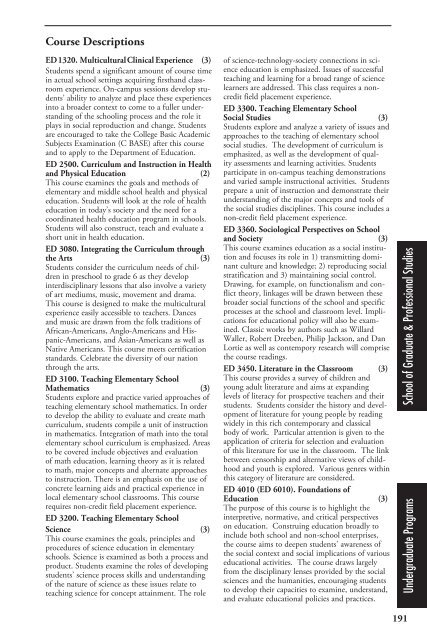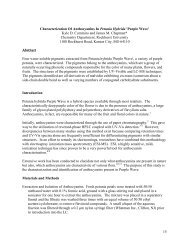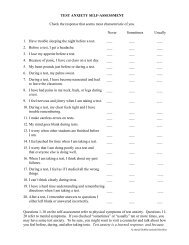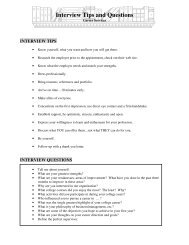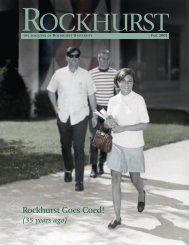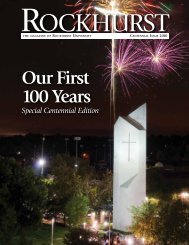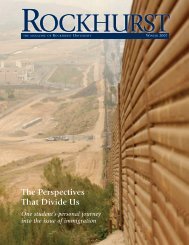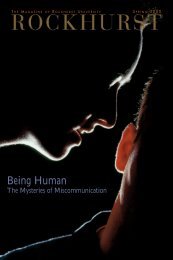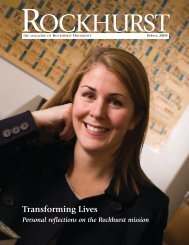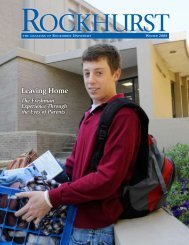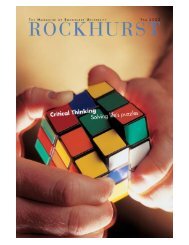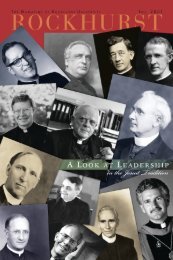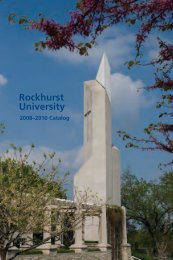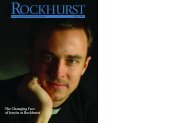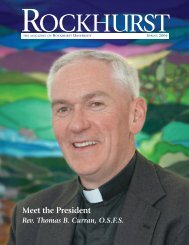RockhuRst univeRsity 2012â2014 catalog
RockhuRst univeRsity 2012â2014 catalog
RockhuRst univeRsity 2012â2014 catalog
- No tags were found...
Create successful ePaper yourself
Turn your PDF publications into a flip-book with our unique Google optimized e-Paper software.
Course DescriptionsED 1320. Multicultural Clinical Experience (3)Students spend a significant amount of course timein actual school settings acquiring firsthand classroomexperience. On-campus sessions develop students’ability to analyze and place these experiencesinto a broader context to come to a fuller understandingof the schooling process and the role itplays in social reproduction and change. Studentsare encouraged to take the College Basic AcademicSubjects Examination (C BASE) after this courseand to apply to the Department of Education.ED 2500. Curriculum and Instruction in Healthand Physical Education (2)This course examines the goals and methods ofelementary and middle school health and physicaleducation. Students will look at the role of healtheducation in today’s society and the need for acoordinated health education program in schools.Students will also construct, teach and evaluate ashort unit in health education.ED 3080. Integrating the Curriculum throughthe Arts (3)Students consider the curriculum needs of childrenin preschool to grade 6 as they developinterdisciplinary lessons that also involve a varietyof art mediums, music, movement and drama.This course is designed to make the multiculturalexperience easily accessible to teachers. Dancesand music are drawn from the folk traditions ofAfrican-Americans, Anglo-Americans and Hispanic-Americans,and Asian-Americans as well asNative Americans. This course meets certificationstandards. Celebrate the diversity of our nationthrough the arts.ED 3100. Teaching Elementary SchoolMathematics (3)Students explore and practice varied approaches ofteaching elementary school mathematics. In orderto develop the ability to evaluate and create mathcurriculum, students compile a unit of instructionin mathematics. Integration of math into the totalelementary school curriculum is emphasized. Areasto be covered include objectives and evaluationof math education, learning theory as it is relatedto math, major concepts and alternate approachesto instruction. There is an emphasis on the use ofconcrete learning aids and practical experience inlocal elementary school classrooms. This courserequires non-credit field placement experience.ED 3200. Teaching Elementary SchoolScience (3)This course examines the goals, principles andprocedures of science education in elementaryschools. Science is examined as both a process andproduct. Students examine the roles of developingstudents’ science process skills and understandingof the nature of science as these issues relate toteaching science for concept attainment. The roleof science-technology-society connections in scienceeducation is emphasized. Issues of successfulteaching and learning for a broad range of sciencelearners are addressed. This class requires a noncreditfield placement experience.ED 3300. Teaching Elementary SchoolSocial Studies (3)Students explore and analyze a variety of issues andapproaches to the teaching of elementary schoolsocial studies. The development of curriculum isemphasized, as well as the development of qualityassessments and learning activities. Studentsparticipate in on-campus teaching demonstrationsand varied sample instructional activities. Studentsprepare a unit of instruction and demonstrate theirunderstanding of the major concepts and tools ofthe social studies disciplines. This course includes anon-credit field placement experience.ED 3360. Sociological Perspectives on Schooland Society (3)This course examines education as a social institutionand focuses its role in 1) transmitting dominantculture and knowledge; 2) reproducing socialstratification and 3) maintaining social control.Drawing, for example, on functionalism and conflicttheory, linkages will be drawn between thesebroader social functions of the school and specificprocesses at the school and classroom level. Implicationsfor educational policy will also be examined.Classic works by authors such as WillardWaller, Robert Dreeben, Philip Jackson, and DanLortie as well as contempory research will comprisethe course readings.ED 3450. Literature in the Classroom (3)This course provides a survey of children andyoung adult literature and aims at expandinglevels of literacy for prospective teachers and theirstudents. Students consider the history and developmentof literature for young people by readingwidely in this rich contemporary and classicalbody of work. Particular attention is given to theapplication of criteria for selection and evaluationof this literature for use in the classroom. The linkbetween censorship and alternative views of childhoodand youth is explored. Various genres withinthis category of literature are considered.ED 4010 (ED 6010). Foundations ofEducation (3)The purpose of this course is to highlight theinterpretive, normative, and critical perspectiveson education. Construing education broadly toinclude both school and non-school enterprises,the course aims to deepen students’ awareness ofthe social context and social implications of variouseducational activities. The course draws largelyfrom the disciplinary lenses provided by the socialsciences and the humanities, encouraging studentsto develop their capacities to examine, understand,and evaluate educational policies and practices.School of Graduate & Professional StudiesUndergraduate Programs191


